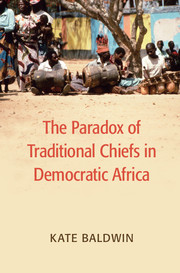Book contents
- Frontmatter
- Dedication
- Contents
- List of Figures
- List of Tables
- Acknowledgments
- PART I TOWARD A NEW THEORY OF CHIEFS
- PART II CHIEFS, DEVELOPMENT, AND ELECTIONS IN ZAMBIA
- PART III TRADITIONAL LEADERS IN AFRICA AND BEYOND
- 9 Chiefs and Government Responsiveness across Africa
- 10 Development Brokers Revisited
- Appendix A Cross-National Data Set of Chiefs' Power
- Appendix B List of Interviews and Interview Protocols
- Appendix C Data Set on Local Public Goods and Chiefs
- Appendix D Survey of Chiefs and Chiefdom-Level Data Set
- Appendix E Household Survey and Experiment
- References
- Index
- Books in the Series
9 - Chiefs and Government Responsiveness across Africa
from PART III - TRADITIONAL LEADERS IN AFRICA AND BEYOND
Published online by Cambridge University Press: 05 November 2015
- Frontmatter
- Dedication
- Contents
- List of Figures
- List of Tables
- Acknowledgments
- PART I TOWARD A NEW THEORY OF CHIEFS
- PART II CHIEFS, DEVELOPMENT, AND ELECTIONS IN ZAMBIA
- PART III TRADITIONAL LEADERS IN AFRICA AND BEYOND
- 9 Chiefs and Government Responsiveness across Africa
- 10 Development Brokers Revisited
- Appendix A Cross-National Data Set of Chiefs' Power
- Appendix B List of Interviews and Interview Protocols
- Appendix C Data Set on Local Public Goods and Chiefs
- Appendix D Survey of Chiefs and Chiefdom-Level Data Set
- Appendix E Household Survey and Experiment
- References
- Index
- Books in the Series
Summary
This chapter moves beyond the Zambian case to study the role of traditional leaders elsewhere in Africa. Throughout the chapter I aim to assess whether the development-broker theory, which predicts positive effects of chiefs on development and government responsiveness, or the vote-broker theory, which predicts the opposite, better fits the evidence. The first section of this chapter considers the role of chiefs in facilitating public works projects drawing on case studies from across Africa. The second section uses cross-national data to address the question of whether powerful traditional chiefs are associated with more responsive governments. The final section discusses whether the theory's scope conditions limit its applicability to Africa or if it has broader applicability.
Chiefs and Development in Africa
As a first step in probing the broader validity of the development-broker model, I examine the role of chiefs in facilitating local development and governance in five countries in sub-Saharan Africa. I draw in part on my own research in Ghana and Liberia but also on qualitative analysis and quantitative data collection conducted by other scholars in Malawi, Sierra Leone, and South Africa. These countries were selected from the set of countries in sub-Saharan Africa considered electoral democracies at the time of this writing. In addition, the selection of cases depended in large part on the availability of data and the richness of existing secondary analyses. As a result, this sample skews toward countries where traditional chiefs maintain significant power, and this part of the analysis should be interpreted as analyzing the role chiefs play in the delivery of development projects in countries where they are considered significant actors. For each of these cases, I consider the evidence on chiefs' roles both in facilitating local development projects and in mediating the government's development activities.
Malawi
I begin by considering the case of Malawi, one of the poorest countries in the world. The Malawian government is continually short on resources, and its bureaucracy has a weak presence outside the country's urban areas. Instead, rural areas are organized into geographically delineated traditional authorities led by paramount chiefs, senior chiefs, or chiefs. A hierarchy of subchiefs, group headmen, and village headmen exists below each chief.
- Type
- Chapter
- Information
- The Paradox of Traditional Chiefs in Democratic Africa , pp. 159 - 177Publisher: Cambridge University PressPrint publication year: 2015



